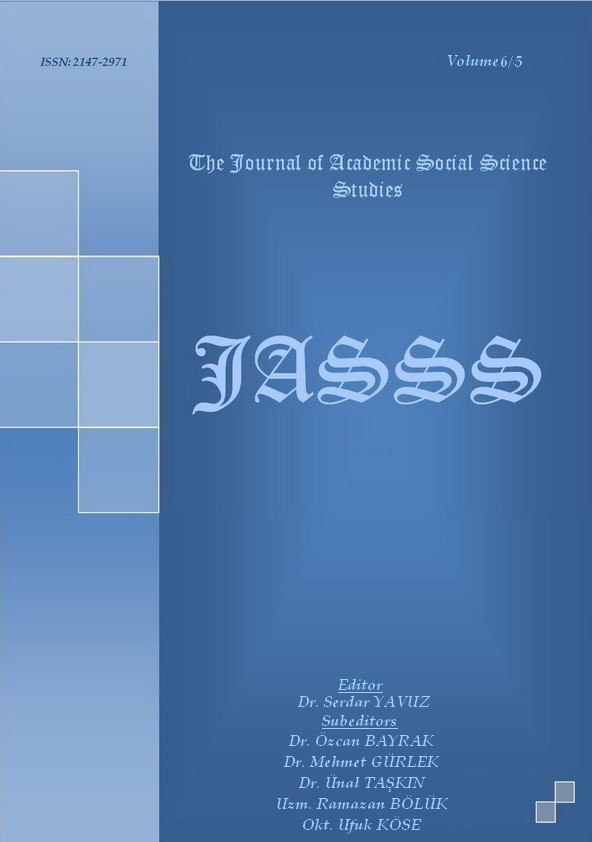ORTAÖĞRETİM FELSEFE DERSİ ÖĞRETİM PROGRAMI VE YGS (YÜKSEKÖĞRETİME GEÇİŞ SINAVI) SORULARININ KARŞILAŞTIRMALI ANALİZİ
Author :
Abstract
Öz Bu araştırma “Ortaöğretim Felsefe Dersi Öğretim Programı” ile Yükseköğretime Geçiş Sınavı (YGS) soruları arasındaki ilişkiyi kapsam geçerliği açısından ortaya koymak amacıyla yapılmıştır. Betimsel yöntem kullanılan araştırmanın verileri 2010-2013 yılları arasında YGS sınavının sosyal bilimler testi bölümlerinde yer alan toplam 40 felsefe sorusundan oluşmuş ve bu sorular, “Ortaöğretim Felsefe Dersi Öğretim Programı” ile karşılaştırılmıştır. Araştırmanın veri analiz sürecinde, öncelikle felsefe dersi öğretim programı çerçevesinde öğretim yılı boyunca her üniteye ayrılan süre, arkasından YGS sosyal bilimler testi içinde yer alan derslere ait soruların yıllara göre dağılımı belirlenmiştir. Araştırmanın sonraki aşamasında da 2010-1013 yıllarına ait YGS’de yer alan felsefe soruların ünitelere ve etkinliklere dağılımı frekans ve yüzde olarak saptanmış, etkinlik kategorilerine göre analiz edilmiştir. Araştırma sonucunda elde edilen verilere göre 2010-2013 yılları arasında en fazla soru gelen sosyal bilimler testi tarih iken, coğrafya ikinci sırada ve felsefe üçüncü sırada yer almıştır. 2013 yılında tarih ve coğrafya sorularında bir azalma görülürken felsefe sorularında artma olmuş, felsefe, tarihten sonra ikinci sıraya yerleşmiştir. Ayrıca 2013 yılında sosyal bilimler testine din kültürü ve ahlak bilgisi soruları da eklenmiştir. Felsefe sorularının kapsam düzeyi açısından en fazla Ahlak Felsefesi ünitesi ile ilgili olduğu en az ise Din Felsefesi ünitesiyle ilgili olduğu saptanmıştır. Ayrıca ders saatinin fazla olmasına rağmen Varlık Felsefesi ünitesinin, Felsefeyle Tanışma ünitesinin gerisinde kaldığı görülmüştür.
Keywords
Abstract
Abstract This research aims to reveal the relationship between Secondary Education Philosophy Curriculum and Transition to Higher Education Transition Exam (YGS) questions with regard to content validity. Data of this research using descriptive methodology were 40 philosophy questions asked in the sections of YGS social studies tests between the years 2010-2013 and they were compared with Secondary Education Philosophy Curriculum. During the data analysis process of the research, time period assigned to each unit within the philosophy course curriculum throughout the academic year and afterwards distribution of questions based on years from different courses found in YGS social studies test were determined. In the next stage of the research, frequency distribution of the philosophy questions into units and activities and their percentages were determined and analyzed based on activity categories. According to the data obtained from the study, between the years 2010-2013 while the highest number of questions was asked from history, geography took the second place and philosophy took the third. In 2013, as a decrease was observed in the number of questions asked from history and geography, there was an increase in the number of questions asked from philosophy; therefore philosophy took the second place after history. Also in year 2013, religious culture and moral knowledge questions were added to social sciences test. It was found that, in terms of the level of coverage, philosophy questions are most related to the Moral Philosophy unit and least related to the Philosophy of Religion unit. Moreover, though course hours are high Ontology unit seems to be falling behind the Introduction to Philosophy unit.





